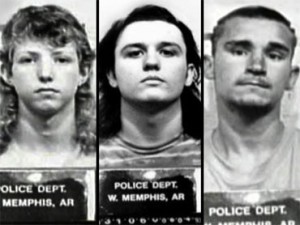West Memphis 3 Release Should Lead to Judicial Reform
One of the most drawn-out and controversial criminal cases in recent American history may have finally come to a close. By the time this post goes live, the West Memphis 3 will have been released from prison, after serving nearly 2 decades in prison for the murders of 3 boys in West Memphis, Arkansas.
During their trial, the prosecution alleged that the killings were part of a satanic ritual. Throughout the 1980s and 1990s, the United States was gripped by a moral panic over rumors of so-called “Satanic ritual abuse,” claiming that satanic cults were kidnapping and torturing/killing innocent victims, usually children.
 Of course, since then, absolutely no real evidence has surfaced pointing to the existence of such cults. Officials from the FBI have confirmed that they have never seen any evidence that satanic ritual abuse has taken place anywhere in the U.S., or that such cults exist, or have ever existed.
Of course, since then, absolutely no real evidence has surfaced pointing to the existence of such cults. Officials from the FBI have confirmed that they have never seen any evidence that satanic ritual abuse has taken place anywhere in the U.S., or that such cults exist, or have ever existed.
In fact, the hysteria over such abuse started because some therapists who engaged in “memory recovery” – a practice resting on the premise that memories can be repressed by traumatic events, and recovered by hypnosis – which has since been completely discredited, and is regarded by all reputable psychologists as pseudoscience.
Meanwhile, back in the world of reality, actual investigators were hard at work on the case of the West Memphis 3. Major advances in forensic science allowed biological samples from the crime scene to be tested for DNA, determining who they came from. As it turned out, there was no DNA from any of the defendants at the crime scene. However, they did find DNA from the stepfather of one of the victims.
Upon the revelation of this evidence, the 3 defendants went to a court asking to be released. The court allowed each of them to enter an “Alford plea,” which allows them to assert their innocence, while acknowledging that the prosecution nonetheless has enough evidence to convict them. They were sentenced to 10 years in prison, but the sentences were suspended, allowing them to go free.
In the intervening years, the case became a rallying point for many different causes, including prison reform, death penalty abolition, and sentencing reform. Because of the apparent high likelihood that the three defendants are innocent, and the seeming intransigence of the justice system in considering new evidence that pointed to their innocence, controversy surrounding the case continued to simmer for the last 18 years.
Personally, I think that the defendants are probably innocent. And even if they’re not, it doesn’t look like the prosecution had nearly enough evidence to prove their guilt beyond a reasonable doubt.
More importantly, however, I think this case has laid bare some serious flaws in our criminal justice system. I should make clear that I believe our justice system is, overall, very good. However, it’s not perfect, and we should constantly strive to identify and mitigate these imperfections.
For example, there is little standardization in how crime scenes are investigated at the local level. In this case, there was immediate and strong criticism directed at the local authorities’ handling of the crime scene, including allegations that a good deal of evidence was lost because the local police didn’t follow fairly basic forensic procedures. This was probably not due to malice. The small local police force simply had no experience dealing with crimes of this magnitude, and probably didn’t even know where to begin their investigation, and even if they did, they lacked most of the necessary resources.
While it might be costly at first, the federal government could play a role in assisting local police forces on this front. They could provide funding to local police departments, specifically for the purpose of improving their forensic science capabilities, in the form of training and equipment. This funding could then be conditioned on local police forces adhering to some minimum standards of competence, enforced via random audits.
Also, we could probably do with some moderate reforms to the jury system. The trial of the West Memphis Three showed that jurors are sometimes susceptible to prosecutorial arguments based on emotion, as well as sensational allegations (such as satanic cults) relating to their cases. Because the constitution guarantees criminal defendants a right to trial by jury, these reforms will necessarily be moderate.
However, I don’t think they need to be radical in order to make the jury system far more effective. While I don’t pretend to have a perfect solution, I think that a few simple reforms, such as placing an emphasis on intelligence and education in jury selection, as opposed to focusing on creating a demographic cross-section of the community, would go a long way.
Some people have proposed using panels of “professional jurors” in complex or high-profile cases. Supposedly, they would have more knowledge about how criminal investigations are conducted, and it would be far more difficult to sway their decisions by appealing to their emotions. While I think that this idea has potential, it also has its share of problems, including a greater possibility for corruption.
In the end, I’m glad that the West Memphis Three are free. Based on the evidence, it seems very likely that they are innocent. However, it’s a shame that it took our judicial system so long to acknowledge that fact. Hopefully, this case still has the potential to serve as a catalyst for reform.


Comments